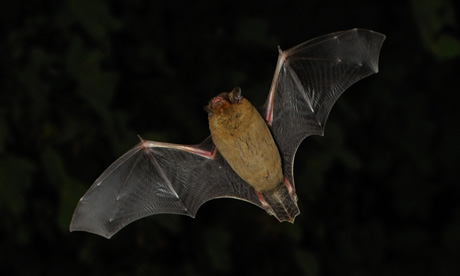RSPB introduces Hackney nightlife as you’ve never seen or heard it

Nocturnal species like this common pipistrelle (Pipistrellus pipistrellus) can be seen around Hackney. Photograph: Laurie Campbell/RSPB
Eschewing home comforts to spend a summer night sleeping under the stars in gardens or wild places to reconnect with the natural world sounds like an exercise in romanticism or an invitation to catch a cold, get rained on or worse.
But sleeping outside for a night is being advocated by one of Britain’s best known wildlife charities, the Royal Society for the Protection of Birds (RSPB).
Creatures of the night like owls, toads and bats are among the nocturnal lifeforms that can be spotted in Hackney by children and grown-ups who opt to take part in the Big Wild Sleepout.
It almost goes without saying that the ubiquitous urban fox is almost certain to be seen.
Embedding oneself in nature for a night can be a full-on sensory experience, according to RSPB press officer and Hackney resident Tim Webb, who says keeping one’s ears open is important when trying to detect the wildlife on our doorsteps.
“You can hear muntjac deer barking, and squirrels make the weirdest noises,” he explains. “You might even be lucky enough to hear a hedgehog scuttling about, but they are quite rare at the moment due to habitat loss.”
Watch out for bugs too. Richard Bashford, an RSPB expert in nocturnal wildlife, says the tobacco plants that can be found in many people’s gardens attract some bizarre-looking moth species along with other nectaring insects.
But it isn’t just the array of wildlife that makes sleeping outside – either in a tent or just a sleeping bag – so special. On the weekend of August 10 and 11, when the RSPB is calling on nature lovers to bed down al fresco, a spectacular meteor shower is expected, although light pollution in London means that to be in with the best chance of seeing shooting stars, it is advisable to leave the city.
For those without gardens, some of the best places to go camping nearby and in the almost-countryside include camp sites just north of Hackney in the upper Lee Valley or Epping Forest.
In the former there are – amazingly – said to be otters, but Tim Webb says these are not the only unexpected visitors to our waterways.
“You get harbour porpoises in the Thames now as far upstream as Greenwich,” he says.
Grey seals have been spotted next to Billingsgate Market in Tower Hamlets.
Mr Webb says the RSPB wants to introduce more people, especially youngsters, to the natural wonders that surround them, from the murmurations of starlings to sonar-producing pipistrelle bats – sights all too often overlooked in our wired and ultra-high tech age, especially in the city.
Binocular-wielding twitchers might not always be the best for capturing the zeitgeist, but in this case they appear to have come close.
Romantic yearning for nature has become rather à la mode recently. Writing in The Guardian earlier this year, journalist Steven Poole identified the reappearance of a trend for “books about walking around and discovering yourself in nature” (George Monbiot’s Feral, Amy Leach’s Things That Are and Tim Dee’s Four Fields are examples), which he somewhat dismissively called the literary equivalent of the rise of the north London ‘farmers’ market’”.
Whatever the reason for this trend, it is a boon for organisations fighting to save habitats.
Exotic David Attenborough wildlife programmes are one thing, but you can’t beat seeing real live nature on home turf, hence the RSPB is suggesting that Sleepout participants get sponsored to raise money for its Give Nature a Home campaign.
The charity shows homeowners simple ways to make their gardens better for wildlife and backs efforts to boost biodiversity in parks.
So, pitch a tent or dig out a sleeping bag and pray it won’t rain on August 10 and 11.
For more information on the Big Wild Sleepout visit www.rspb.org.uk
